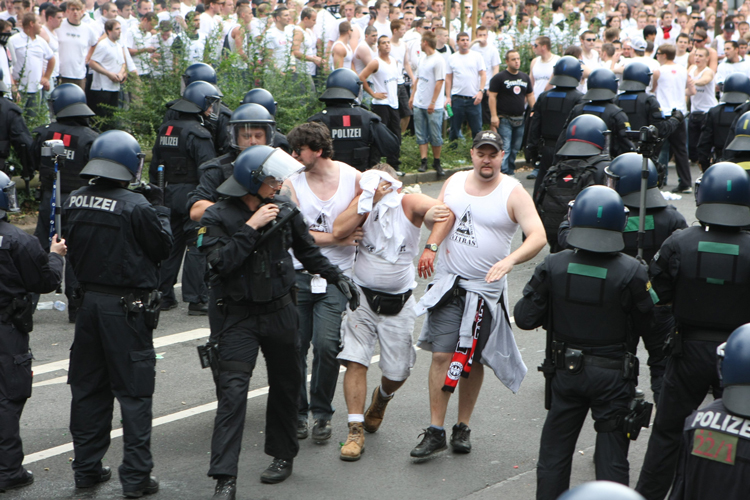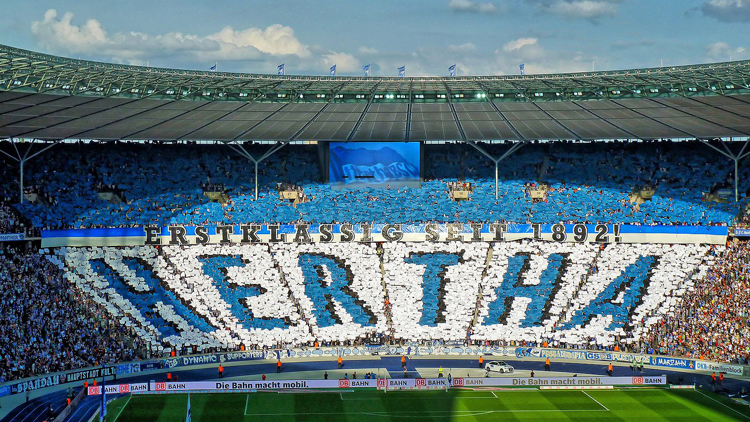Europe´s football leagues are known for having the strongest leagues in the world. Teams such as the FC Barcelona, Manchester City or Bayern Munich dominate their leagues, playing diverse styles of football. However, Europe’s fan cultures are just as diverse when looking at the different countries like Spain, England or Germany. Although, there is one red thread which is commonly shared amongst the top leagues in this continent. Hooligans.
Germany And Its Hooligan Problem

Hooligans of Eintracht Frankfurt | Heptagon on Wikimedia
Bremen, Cologne and Dortmund. The list of the “Ultra-groups” in Germany are long and the the “0231-Riots” (an ex-right winged hooligan group) terrorised football stadiums primarily in Germany leaving horrible sceneries behind. In last year’s game between Dortmund and RB Leipzig, Dortmund fans held up banners with hate-speeches against Leipzig´s Manager Ralf Rangnick who suffered from a burn-out, years before when managing the FC Schalke 04. One of the banners said: “Burn-out Ralle, hang yourself!”. Hate speeches such as these banners tend to place hooligan groups throughout Germany in a very negative light.
In the same season, members of the hooligan group “0231-riot” were caught being equipped with fighting gloves and Bengal lights by the police nearby Darmstadt, where Dortmund played their Bundesliga match against the SV Darmstadt. Such behaviour is not an only case. All over Germany, right winged hooligan groups attempt to cause chaos.
However, Germany’s fan culture also has its upsides. With astonishing choreographies, inside and outside of the stadiums with very high standards, peaceful hooligans tend to give a different understanding about their fan culture.
The Lack In English Solidarity And The Increasing Prices In Tickets
Talking with many English football fans in the United Kingdom, one thing clearly stood out. The lack of solidarity between the fans of different English football fans. Meanwhile it is understandable that football fans from Manchester United don’t want Manchester City to win the Premier League, it is hard to understand why fans from Manchester United would refuse to watch a Euro-league semi-final just because a different football team than Manchester United is playing. In an interview, an Arsenal fan made it clear that this “dilemma” can be seen throughout the whole fan base in the Premier League. Clearly the lack of solidarity seems to be a problem in the English fan culture, as fans do not seem to show any interest of supporting a club from their own country, even if it is the last team remaining.
Talking about hooliganism in England, it is safe to say that football tunred into a rather peaceful sport when looking at the fans, although there are still a few problems to overcome which result out of a strong rivalry between certain Clubs such as the Millwall FC and West Ham United.
This is not the only problem with fans of the English Premier League. The continuously rising TV-deals in the “Prem” in combination with the many investors operating in clubs like the FC Chelsea or Manchester City, take a negative effect on the ticket prices, as most English football fans are incapable of buying tickets as these prices are too high for most football fans. As an example, the current price for a seasonal ticket for the FC Arsenal starts at over 1600 Pounds (approximately 1800 Euros) at its cheapest. In relation to this seasonal ticket price, the cheapest ticket for a seasonal ticket of the FC Bayern Munich costs about 340 Euros.
How Political Ideologies Influence Spanish Football Fans
Spanish football is known for great teams with astonishing histories such as the FC Barcelona and Real Madrid. But when talking to a Spanish football fan from Seville, one thing stood out. The influence which political ideologies have on Spanish fans. In the interview, the fan made it clear that Spanish fans generally support two teams. The first one and main team which is being supported is the local team. As an example, in Seville most fans are either Real Betis, FC Seville or Atletico Seville fans. However, the second team then depends on the political ideologies. This can be traced back to when Franco was the Spanish leader. Back then Real Madrid and the FC Barcelona were already the most successful teams in the Spanish Premiera Division and meanwhile the FC Barcelona was seen to be the rather liberal and left-winged superpower in Spain´s first Division, Real Madrid was portrayed to be more conservative and right winged. Until today, these political ideologies influence how Spanish football fans think, making them either Barcelona or Madrid fans.
In regards to explicit violence inside the Spanish fan culture, the last incident happened in October 2017, in Barcelona in which apparently fans from Atletico Madrid, FC Valencia and the FC Barcelona were involved. Again, political ideologies were the reason behind the fight, as a demonstration against Catalonia´s independency.
Overall, the German, English and Spanish football-fan culture varies a lot through tradition, the recent background and political views in the given country. And whilst hooliganism until today is still active in certain parts of their initial countries, the incidents start to gradually decline for now. It will be important to see whether this trend will continue to decline as although a certain topicality is vital to keep football interesting, fights and violence should not be portrayed within such a beautiful sport.

